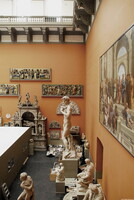Victoria and Albert Museum Cast Courts
Cole, Henry; Scott, Henry Young Darracott

Download1A2-E-L-VA-A3_cp.jpg (371.2Kb)
Date
1873Description
The Cast Courts at the V&A, two vast galleries [East Court and West Court] that house the Museum's most important plaster cast and electrotype reproductions, make a significant impression on visitors. These faithful copies were mainly taken from works of art or architectural details throughout Europe during the nineteenth century, when the collecting of such casts was at its most popular. The South Kensington Museum (as the V&A was originally known) was at the forefront of this enthusiasm for collecting plaster cast reproductions and electrotypes. The Museum commissioned or bought these reproductions from some of the leading cast manufacturers of the day. Many were gifts from other institutions, or came via the Convention for Promoting Universal Reproductions of Works of Art. This was the brainchild of Henry Cole, the Museum's first director, who saw the great educational benefits in amassing a comprehensive collection of casts. In 1867 Cole encouraged fifteen European princes, including Albert Edward, Prince of Wales, to sign up to an agreement that would establish a formal procedure for the exchange of casts between European museums. The collection that was assembled allowed people who could not travel abroad to admire some of the major European monuments and works of art. The Cast Courts (originally named the Architectural Courts) were opened in 1873, the collected casts date from ca. 1852 to 1951.; The Cast Courts at the V&A, two vast galleries [East Court and West Court] that house the Museum's most important plaster cast and electrotype reproductions, make a significant impression on visitors. These faithful copies were mainly taken from works of art or architectural details throughout Europe during the nineteenth century, when the collecting of such casts was at its most popular. The South Kensington Museum (as the V&A was originally known) was at the forefront of this enthusiasm for collecting plaster cast reproductions and electrotypes. The Museum commissioned or bought these reproductions from some of the leading cast manufacturers of the day. Many were gifts from other institutions, or came via the Convention for Promoting Universal Reproductions of Works of Art. This was the brainchild of Henry Cole, the Museum's first director, who saw the great educational benefits in amassing a comprehensive collection of casts. In 1867 Cole encouraged fifteen European princes, including Albert Edward, Prince of Wales, to sign up to an agreement that would establish a formal procedure for the exchange of casts between European museums. The collection that was assembled allowed people who could not travel abroad to admire some of the major European monuments and works of art. The Cast Courts (originally named the Architectural Courts) were opened in 1873, the collected casts date from ca. 1852 to 1951. Source: V&A (Victoria and Albert Museum) [website]; http://www.vam.ac.uk/ (accessed 4/26/2009)
Type of Work
art museum; replicaSubject
decorative arts, Art museums, Museology, plaster sculpture, electrotypes, art education, Nineteenth century
Rights
Rights Statement
Licensed for educational and research use by the MIT community only